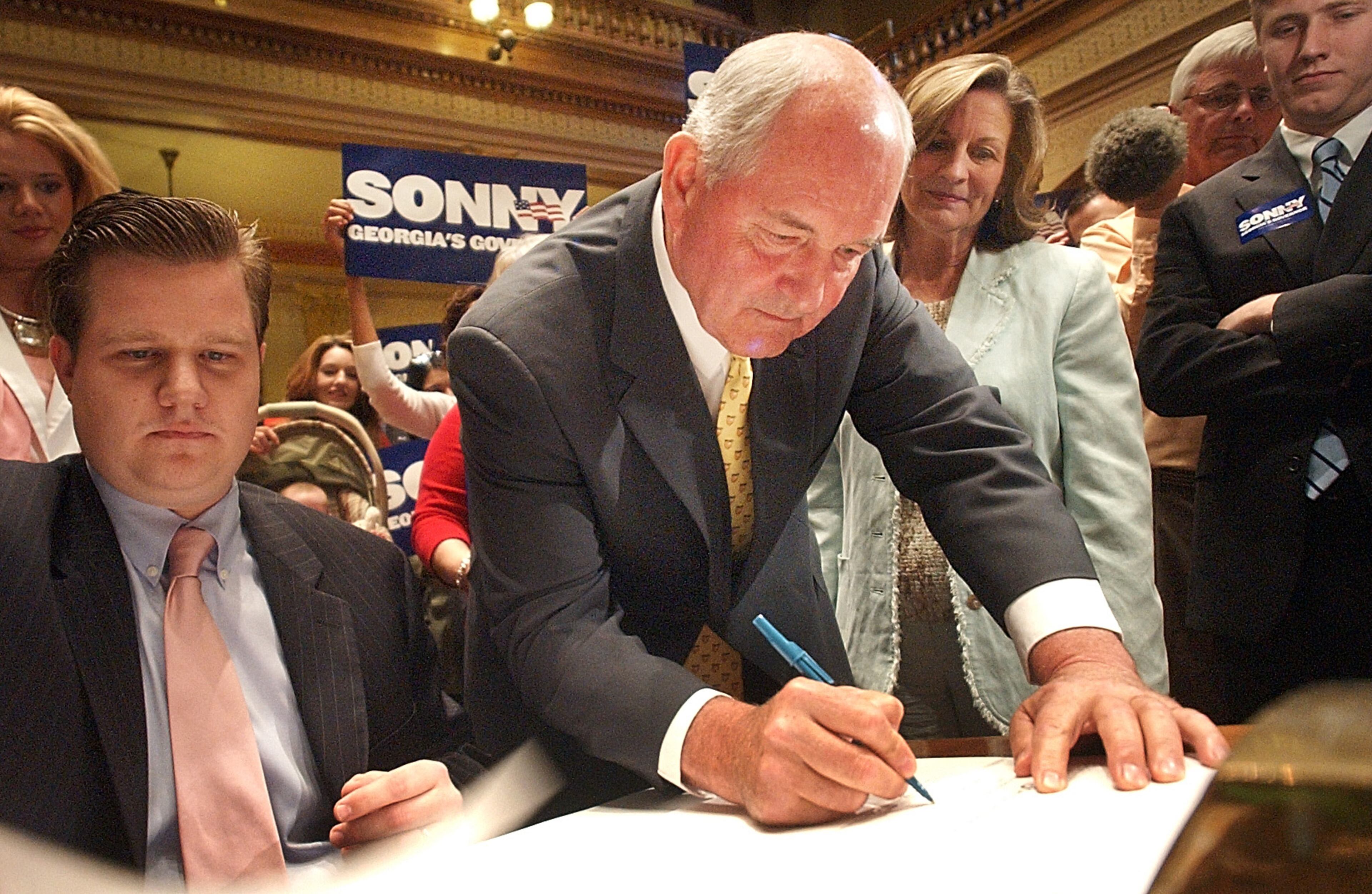Georgia party switchers face mixed results. Can Geoff Duncan change that?

Today’s newsletter highlights:
- Democrats warn about increasing health insurance costs.
- Austell City Council members table a pay raise.
- Most Georgia nursing homes facing financial risk are in GOP congressional districts.
Party switchers

Georgia has a long history of party switching politicians. But if former Lt. Gov. Geoff Duncan ever runs for office as a Republican-turned-Democrat, history shows he could have a tough time convincing enough voters that he’s changed.
Party switching surged across the South around the turn of the century, when conservative, rural Democrats entrenched in state legislatures throughout the region bailed for the Republican Party before it was too late.
Georgia experienced a wave of party switchers around the time that former Democrat Sonny Perdue won the governor’s office as a Republican in 2002. His successor, Nathan Deal, also made the switch — having left the Democratic Party in 1995.
Some fared well. State Rep. Alan Powell flipped to the GOP in 2010 and has coasted to reelection ever since. Lauren “Bubba” McDonald, who once ran for governor as a Democrat in 1990, now serves as a Republican member of the Public Service Commission.

Others flamed out. Perhaps the most famous example came in 1968, when five statewide elected Democrats jumped ship shortly after the party nominated Hubert Humphrey for president. The most prominent was the late James L. Bentley, who was the comptroller general. None of the five ever won elected office again.
Recently, party switchers have had more cautionary tales than success stories.
Ex-state Rep. Vernon Jones, the former Democratic CEO of deep-blue DeKalb County, tried to rebrand himself as a MAGA Republican. He launched failed bids for both governor and U.S. House in 2022.
Mesha Mainor, a former Democratic state House member, last year lost a left-leaning Atlanta-based seat by more than 67 percentage points after switching to the GOP.
And now Doug McKillip, who briefly led the House Democratic caucus before spurning his party, is running for an open Athens-based Senate seat as a loyalist to President Donald Trump.
Things to know

Good morning! State senators will meet this afternoon to discuss chronic absenteeism in schools. The meeting comes as new data shows that the rate of chronically absent students fell to 19.5% in the most recently completed school year.
Here are three other things to know for today:
- More than 20 former Roswell elected officials signed a letter calling on Mayor Kurt Wilson and City Council members to pause a development project that has been removing trees outside of an antebellum property, the AJC’s Reed Williams reports.
- Foreign-born commercial truck drivers worry new rules reviving strict enforcement of English-language proficiency could put their careers in jeopardy, the AJC’s Gray Mollenkamp reports.
- The Trump administration’s decision to halt $500 million in research funding includes a grant for Emory University studying the use of mRNA antiviral therapy, the AJC’s Ariel Hart reports with help from the Associated Press.
Health subsidies

Health insurance companies across the country are planning double-digit premium increases on state marketplaces next year. And if that happens, Democrats want to make sure voters know who to blame.
An analysis of initial rate filings by Peterson-KFF found the median rate hike request nationally is 18%, or more than double what it was last year. In Georgia, the average requested increase was 21% based on preliminary filings, per the AJC’s Ariel Hart.
A majority of insurers said a big reason for the increase is the likely expiration of enhanced federal subsidies at the end of this year. Congress passed the subsidies after the pandemic and extended them in 2022, back when Democrats controlled the White House and the Senate. But their fate is uncertain now that Republicans control Washington.
“We’re going to see Georgians with private health insurance today losing access in just a few months, precisely because of Republican policies,” said House Minority Caucus Whip Sam Park, D-Lawrenceville, said Wednesday during a press call organized by the Defend America Action super PAC.
Some Republicans have opposed the subsidies, arguing they cost too much and many of the discounts benefit people with higher incomes who don’t need them.
Strike that
If there’s ever a good time for politicians to ask for a raise, it’s probably not on the heels of a triple digit tax increase, as the Austell City Council learned this week.
The Cobb County city angered its residents when it voted 5-1 last month to raise property taxes 154%. About two weeks later, Council member Devon Myrick proposed a $2,000 pay raise for the mayor and a $4,000 increase for the other council members.
The council unanimously voted to table that pay raise this week following a public outcry, according to the Marietta Daily Journal.
Austell is one of several local governments eying tax increases this year to make up for falling revenues. The city of 8,000 people has an annual budget of about $127 million.
But even when times are good, it’s still tough for politicians to give themselves a raise. Georgia state lawmakers briefly considered giving themselves, the governor and other statewide officers a huge pay increase earlier this year, but thought better of it.
Nursing homes

Georgia Democrats have been sharing a study by Brown University showing that 37 of the state’s nursing homes are in danger of closing because of budget cuts in President Donald Trump’s new tax and spending bill.
The AJC’s Ariel Hart and Tamar Hallerman took a closer look at the list and found that 11 of those nursing homes have improved their quality ratings enough to not be in jeopardy, leaving 26 that are in danger.
Of those in danger, 17 are in Republican congressional districts represented by House members who voted for the law that Trump dubbed the “big, beautiful bill.” Georgia U.S. Reps. Mike Collins and Buddy Carter, both Republican candidates for the U.S. Senate, each have one in their districts.
U.S. Rep. Rick Allen, R-Augusta, has the most with six. U.S. Rep. Austin Scott, R-Tifton, has five. Among Democrats — who did not vote for the law — U.S. Rep. Sanford Bishop of Albany has five in his district while Nikema Williams of Atlanta has three.
Nursing homes made the list if they have at least 85% of residents receiving Medicaid assistance, a less than 80% occupancy rate and a federal star rating of one or two out of five.
The Georgia Health Care Association, the industry group representing nursing homes, says the analysis is false because it’s based on a previous version of the tax and spending bill that did not pass. But researchers at Brown University say their findings still stand.
Listen up

Today on the “Politically Georgia” podcast, Wall Street Journal reporter Josh Dawsey joins the show to share behind-the-scenes stories from his book “2024: How Trump Retook the White House and the Democrats Lost America,” which he wrote with two other journalists.
You can listen and subscribe to Politically Georgia for free at Apple Podcasts, Spotify or wherever you get your podcasts.
Have a question or comment for the show? Email us at politicallygeorgia@ajc.com or give us a call at 770-810-5297 and you could be featured on a future episode.
Trump today
President Donald Trump is scheduled to sign executive orders and then give a speech from the White House.
Shoutouts
Want a birthday shoutout in the Politically Georgia newsletter? There’s a form for that. Click here to submit the shoutouts. It’s not just birthdays. We’re also interested in new jobs, engagements, birth announcements, etc.
Before you go

Violent crime in Georgia fell approximately 10.5% in 2024 from the previous year, according to new data released by the FBI. Nationally, violent crime fell by 4.5%.
That’ll do it for us today. As always, you can send your best scoops, gossip and insider info to greg.bluestein@ajc.com, tia.mitchell@ajc.com, patricia.murphy@ajc.com and adam.beam@ajc.com.
More Stories
The Latest






